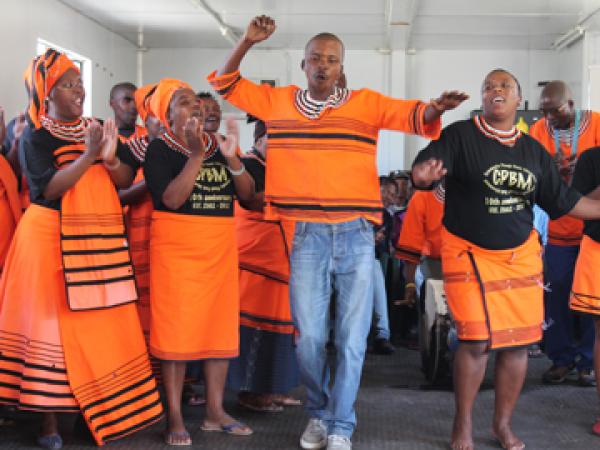Choir group in Langa reduces unemployment

Ezethu (“Ours”) is an indigenous choir ensemble that preserves and promotes Xhosa culture by celebrating traditional music. Its members, who come from Gugulethu and Langa, bring ceremonial music to younger generations.
Remarkably, they also generate their own income, which is rare for such groups. They are based with the non-profit organization Community Plough Back Movement (CPBM), which has a school enrichment program, a food gardening program, and an income generating beading project. CPBM also oversees a number of HIV/AIDS community interventions.
The organisation got its name from the mission of its founders, who all came from townships, had academic achievements, and wanted to plough something back into the community.
Ezethu started twelve years ago when the founders of CPBM realized that the parents of the children in its after-school program were unemployed.
“We want to have income generation for those who don’t have formal skills, but have God given talents,” says Professor Mtetwa, a retired Associate Professor of Adult and Consulting Education, and founder of CPBM.
“This group is about accepting your own identity,” she says. “It raises the self-esteem of its members.”
Ezethu can be hired to perform ceremonial songs at funerals, weddings, for men before they go to initiation school, and for other traditional events.
A highlight for the group was during the 2010 World Cup, when they performed for the Queen of Spain at Artscape.
Many members of Ezethu go to CPBM headquarters daily to participate in the organisation’s other income-generating programs. Singing in the choir is for most members their main creative outlet. Ezethu helps its younger choir members to keep a strong connection to traditional music.
“Some people say young people aren’t interested in traditional music. This isn’t true. These are children in the urban areas that are very interested,” said Professor Mtetwa.
“I have always liked music, but I was a bit shy because in our townships it’s not normal for a young man to express himself musically. You tend to get stigmatized if you explore your musical talents, but here [Ezethu] gave us a platform to express who we really are,” said Thando Hoho, a member of Ezethu.
“I was unemployed, and then Ezethu revived my spirit as an African. It’s not normal that you find a group of young people and old people doing something traditional together … [Ezethu] has been a platform for us to explore our roots. The story of our music is encouragement.”
Support independent journalism
Donate using Payfast

Don't miss out on the latest news
We respect your privacy, and promise we won't spam you.

This article is licensed under a Creative Commons Attribution-NoDerivatives 4.0 International License.
